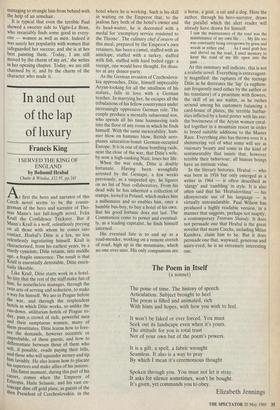In and out of the lap of luxury
Francis King
I SERVED THE KING OF ENGLAND by Bohumil Hrabal Chatto & Windus, f12.95, pp.241 At first the hero and narrator of this Czech novel seems to be the cousin- german of the hero and narrator of Tho- mas Mann's last full-length novel, Felix Krull the Confidence Trickster. But if Mann's Krull is a wolf, relentlessly preying on all those with whom he comes into contact, Hrabal's Ditie is a fox, no less relentlessly ingratiating himself. Krull is characterised, from his earliest years, by a sturdy cynicism; Ditie retains, into middle age, a fragile innocence. The result is that Krull is essentially detestable, Ditie essen- tially likeable.
Like Krull, Ditie starts work in a hotel. So tiny that the rest of the staff make fun of him, he nonetheless manages, through the twin arts of serving and seduction, to make a way for himself. We are in Prague before the war, and through the resplendent hotels in which Ditie works, so unlike the run-down, utilitarian hotels of Prague to- day, pass a crowd of rich, powerful men and their sumptuous women, many of them prostitutes. Ditie learns how to fore- see the demands, however eccentric or improbable, of these guests, and how to differentiate between those of them who will, if possible, evade paying their bills, and those who will squander money and tip him lavishly. He also learns how to placate his superiors and make allies of his juniors.
His finest moment, during this part of his career, comes when the Emperor of Ethiopia, Haile Selassie, and his vast en- tourage dine off gold plate, as guests of the then President of Czechoslovakia, in the hotel where he is working. Such is his skill in waiting on the Emperor that, to the jealous fury both of the hotel's owner and its head-waiter, he is decorated with a medal for 'exemplary service rendered to the Throne'. The culinary chef d'oeuvre of this meal, prepared by the Emperor's own retainers, has been a camel, stuffed with an antelope, stuffed with a turkey, stuffed with fish, stuffed with hard boiled eggs: a receipt, one would have thought, for disas- ter at any dinner-party.
As the German invasion of Czechoslova- kia approaches, Ditie, himself impeccably Aryan-looking for all the smallness of his stature, falls in love with a German teacher. In marrying her, he escapes all the tribulations of his fellow countrymen under increasingly oppressive German rule. The couple produce a mentally subnormal son, who spends all his time hammering nails into the floor of any room in which he finds himself. With the same inexorability, ham- mer blow on hammer blow, British aero- planes saturation-bomb German-occupied Europe. It is in one of these bombing raids, near the close of the war, that Ditie's wife, by now a high-ranking Nazi, loses her life.
When the war ends, Ditie is doubly fortunate. Having been wrongfully arrested by the Gestapo, a few weeks previously, as a suspected spy, he figures on no list of Nazi collaborators. From his dead wife he has inherited a collection of stamps, looted in Poland, which makes him a millionaire and so enables him, once a humble bus-boy, to buy a hotel of his own. But his good fortune does not last. The Communists come to power and eventual- ly, as a leading capitalist, he finds himself interned.
His eventual fate is to end up as a road-mender, working on a remote stretch of road, high up in the mountains, which no one ever uses. His only companions are a horse, a goat, a cat and a dog. Here the author, through his hero-narrator, draws the parallel which the alert reader will already have drawn for himself:
I saw the maintenance of the road was the maintenance of my own life . . . My life too was constantly being overgrown by grass and weeds at either end . . . As I used grub hoe and shovel on the road, I used memory to keep the road of my life open into the past . . .
As this summary will indicate, this is not a realistic novel. Everything is extravagant- ly magnified: the raptures of the teenage Ditie as he decorates the 'lap' (a euphem- ism frequently used either by the author or his translator) of a prostitute with flowers; the skill of an ace waiter, as he rushes around among his customers balancing a card-house of plates; the terrible barbar- ities inflicted by a hotel porter with his axe; the bovineness of the Aryan women coral- led together in a mountain resort in order to breed suitable additions to the Master Race. Everything also has thrown over it a shimmering veil of what some will see as visionary beauty and some as the kind of sentimentality that insists that, however terrible their behaviour, all human beings have an intrinsic value.
In the literary histories, Hrabal — who was born in 1916 but only emerged as a writer in 1964 — is often described as `slangy' and 'rambling' in style. It is also often said that his `Hrabalov§tina' — his idiosyncratic use of his language — is virtually untranslatable. Paul Wilson has produced a highly readable version, in a manner that suggests, perhaps not inaptly, a contemporary Tristram Shandy. It does not persuade one that Hrabal is the great novelist that many Czechs, including Milan Kundera, claim him to be. But it does persuade one that, wayward, generous and misty-eyed, he is an extremely interesting one.


































































 Previous page
Previous page